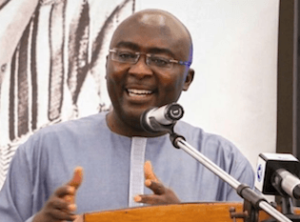Policy decisions are anchored on accurate data – Vice President
 Vice President Dr Mahamudu Bawumia on Wednesday said policy decisions of the Government were based on accurate data and, therefore, called for adequate investment in data gathering processes that would engender development.
Vice President Dr Mahamudu Bawumia on Wednesday said policy decisions of the Government were based on accurate data and, therefore, called for adequate investment in data gathering processes that would engender development.
He said without information it would be difficult for the Government to take accurate decisions concerning national priorities.
He said the data produced by various actors must be consistent with the Sustainable Development Goals, match user needs and easily comprehensible.
The Vice President said this when he delivered the keynote address at Ghana’s Data Roadmap Forum in Accra.
The forum aims at identifying data gaps and aligning national priorities geared towards achieving the United Nations Agenda 2030 Sustainable Development Goals (SDGs).
Vice President Bawumia said there was the need to strengthening administrative data drive by building the capacity of institutions to gather accurate data.
He said the Government had identified three fundamental pillars that would anchor the formalisation of the national economy.
These include the issuance of national identification cards, digital addressing system and enhancing the operability of the unbanked population that would ensure quality service delivery to the citizens.
He said Ghana required a robust data regime and that could be achieved through collaborative efforts of all stakeholders in the public and private institutions.
Dr Bawumia called for galvanisation of resources to ensure harmonious and accurate production of data as there was a synergy between data and development.
“The adoption of the SDGs at the time of data revolution provides us with unpatrolled opportunities to track the implementation of these ambitious goals at every level of our society.
‘‘Country level commitment to the SDGs will not be feasible without fast-tracking the data revolution to provide the right information at the right time that is universally accessible to all,’’ he noted.
Mr Baah Wadieh, the Acting Government Statistician, said the forum was happening at a time when there was considerable change and excitement for a global data community.
He said with the recent National Strategy for the Development of Statistics, Ghana’s Statistical System had committed to producing accurate, relevant, reliable and timely statistics to meet varied user needs.
Mr Wadieh said it had adopted new technologies and innovation for data collection, processing, sharing and dissemination in order to create a harmonious data ecosystem.
The Government Statistician said Ghana was not alone in the effort of data collection but it involved other statistical actors globally working together to remove barriers to data sharing.
“We’re delighted to have recently joined the Global Partnership for Sustainable Development Data, which is a global multi-stakeholder network to harnessing the data revolution for sustainable development,” he said.
He said Ghana had also committed to various continental strategies such as the African Union Agenda 2063 that aimed at ensuring integrated, prosperous and peaceful Africa driven by its own citizens and representing a dynamic force in the international arena
There are 17 SDGs including building an industrialised, inclusive and resilient economy, create equitable, healthy and disciplined society and building a safe and well-planned community while protecting the natural environment.
Others were building effective, efficient and dynamic institutions for national development and strengthening Ghana’s role in international affairs.
The two-day event brought together delegations from Kenya, Senegal, Sierra Leone, Denmark and the United States of America.
There were also delegations from some state institutions that were directly involved in data gathering and some civil society organisations across the country.
Source: GNA
